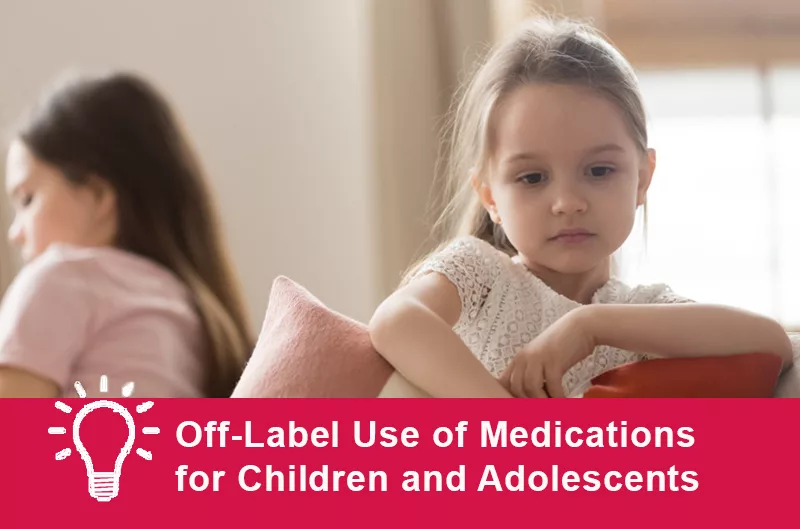In The Carlat Child Psychiatry Report, Elizabeth Tien, MD, a child & adolescent psychiatrist at Maimonides Medical Center in Brooklyn, NY, offers off-label advice on prescribing medications for children with PTSD. Below are some general tips, but to get a handy table on which meds to choose and how to dose, please click here.
SSRIs
Start with psychotherapy for pediatric PTSD. If that isn’t working well enough, think about trying an SSRI, usually sertraline, which can help with depression, irritability, and anxiety. For a child who can’t tolerate sertraline, or if you want to achieve a higher dose more quickly, you can go with citalopram.
Because there’s almost no evidence for using other antidepressants in childhood PTSD, we rarely prescribe SNRIs, MAOIs, TCAs, trazodone, nefazodone, or mirtazapine. We know that clinicians in other practices do favor some of these medications, and given the absence of evidence, one can make a reasonable case for giving them a try empirically—particularly a drug such as mirtazapine, which can theoretically be helpful for traumatized kids who can’t sleep.
Antiadrenergic agents
A small amount of research has endorsed using antiadrenergic meds for symptoms such as hyperarousal, avoidance of triggering situations, and re-experiencing symptoms. For example, a small 2013 open-label study found that extended-release guanfacine was helpful for such symptoms (Connor DF et al, J Child Adolesc Psychopharmacol 2013;23(4):244-51).
Alpha agonists, both clonidine and guanfacine, can be particularly helpful with nightmares, sleep, overall irritability and aggressive behaviors. Both medications have approval for the treatment of ADHD in children. Prazocin is not FDA approved, but there is support for its use in children for nightmares associated with PTSD. Get baseline vital signs before starting alpha agonists and recheck vitals when you adjust the dose or when your patient reports sedation or hypotensive symptoms, such as light-headedness. When you stop these meds, you need to taper gradually to avoid rebound hypertension.
Atypical antipsychotics
While many atypical antipsychotics have pediatric indications for diagnoses ranging from bipolar disorder to psychosis to irritability in autism, consider them a last resort in PTSD. If you do use antipsychotics, favor risperidone and quetiapine, since they have shown some promising results in open-label studies of PTSD. Risperdal can be associated with more EPS and prolactin issues, and both require following BMI, lipids, and glucose. Lower doses of either medication are usually sufficient to address hyperarousal, increased reactivity, and aggressive and disruptive behaviors, which are often what lead clinicians down the atypical antipsychotics trail.
Mood stabilizers
Consider mood stabilizers for traumatized youth with mood lability and aggressive behaviors that have led to hospitalization. Valproic acid and carbamazepine have been effective in open label trials. Valprioc acid can be helpful in severe emotional dysregulation. The most common side effects are drowsiness, headache, and weight gain, but be sure to do lab follow up eg LFTs.
Subscribers can read the full article. Not a subscriber? Join here.
SSRIs
Start with psychotherapy for pediatric PTSD. If that isn’t working well enough, think about trying an SSRI, usually sertraline, which can help with depression, irritability, and anxiety. For a child who can’t tolerate sertraline, or if you want to achieve a higher dose more quickly, you can go with citalopram.
Because there’s almost no evidence for using other antidepressants in childhood PTSD, we rarely prescribe SNRIs, MAOIs, TCAs, trazodone, nefazodone, or mirtazapine. We know that clinicians in other practices do favor some of these medications, and given the absence of evidence, one can make a reasonable case for giving them a try empirically—particularly a drug such as mirtazapine, which can theoretically be helpful for traumatized kids who can’t sleep.
Antiadrenergic agents
A small amount of research has endorsed using antiadrenergic meds for symptoms such as hyperarousal, avoidance of triggering situations, and re-experiencing symptoms. For example, a small 2013 open-label study found that extended-release guanfacine was helpful for such symptoms (Connor DF et al, J Child Adolesc Psychopharmacol 2013;23(4):244-51).
Alpha agonists, both clonidine and guanfacine, can be particularly helpful with nightmares, sleep, overall irritability and aggressive behaviors. Both medications have approval for the treatment of ADHD in children. Prazocin is not FDA approved, but there is support for its use in children for nightmares associated with PTSD. Get baseline vital signs before starting alpha agonists and recheck vitals when you adjust the dose or when your patient reports sedation or hypotensive symptoms, such as light-headedness. When you stop these meds, you need to taper gradually to avoid rebound hypertension.
Atypical antipsychotics
While many atypical antipsychotics have pediatric indications for diagnoses ranging from bipolar disorder to psychosis to irritability in autism, consider them a last resort in PTSD. If you do use antipsychotics, favor risperidone and quetiapine, since they have shown some promising results in open-label studies of PTSD. Risperdal can be associated with more EPS and prolactin issues, and both require following BMI, lipids, and glucose. Lower doses of either medication are usually sufficient to address hyperarousal, increased reactivity, and aggressive and disruptive behaviors, which are often what lead clinicians down the atypical antipsychotics trail.
Mood stabilizers
Consider mood stabilizers for traumatized youth with mood lability and aggressive behaviors that have led to hospitalization. Valproic acid and carbamazepine have been effective in open label trials. Valprioc acid can be helpful in severe emotional dysregulation. The most common side effects are drowsiness, headache, and weight gain, but be sure to do lab follow up eg LFTs.
Subscribers can read the full article. Not a subscriber? Join here.


_-The-Breakthrough-Antipsychotic-That-Could-Change-Everything.webp?t=1729528747)



